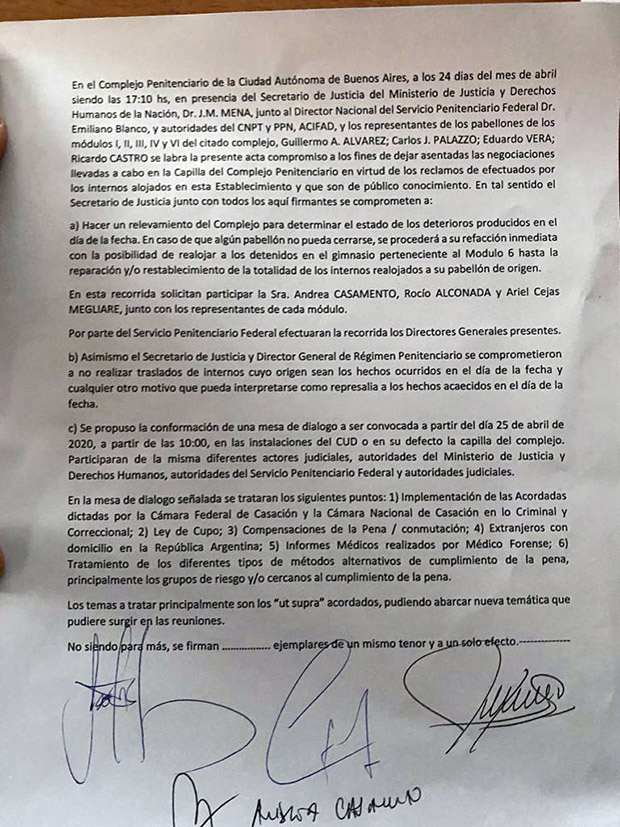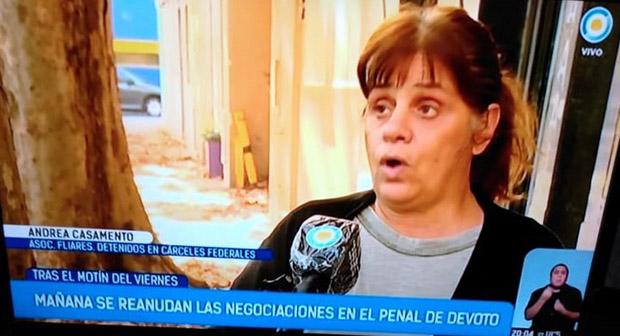In the face of coronavirus, prisons around the world have the makings of a tinderbox for an outbreak. Inmates live in cramped spaces. Sanitation conditions are often poor. Older inmates or those with health conditions live among the general population.
In some cases, worried inmates have demonstrated and demanded protection when the virus arrives at their facility.
One of these demonstrations broke out on a Friday in late April. It happened at Devoto prison here in Buenos Aires, Argentina. I watched news coverage of it all day, sad to see that the peaceful protests had come to this.
For a month, inmates had held demonstrations. They were concerned that a coronavirus outbreak would hit Devoto and spread quickly. They asked that family visitations stop. They asked for basic health precautions. They wanted to feel protected.
Then, a guard tested positive for COVID-19. Feeling like they had no other option, the inmates turned to violent protests. Prisoners yelled from the roof. They set fire to mattresses. A banner declared “We refuse to die in jail.” Another read “COVID-19 in Devoto, genocidal judges.”
After hours of unrest, a group of four people met to try to find a peaceful resolution. One of these four was Andrea Casamento, the only representative from a civil society organization.
Andrea runs ACIFAD, a local partner of CWS in Buenos Aires. ACIFAD is an association of prisoners’ families. Over the radio, the prisoners requested that Andrea be at the negotiation table. They were counting on her to fight for their families and their own conditions. And eventually, after four meetings held at the prison, she helped broker an agreement and the protest ended.
Across Latin America, prisoners’ families play a much larger role in supporting each inmate than they do in the United States. Families provide the food that their incarcerated relative cooks and eats. They provide bedding, clothing and hygiene supplies. This network of women–because in 99% of cases, it is women–are largely invisible. But they are also indispensable. And with help from CWS, Andrea has worked tirelessly to bring them out of the shadows.
“There are about 100,000 prisoners in Argentina,” Andrea explains. “For each one of them, there is a mother, a partner, a daughter or an aunt who is constantly thinking and organizing to bring them food, medicine, clothing and support.”

The agreement signed by Andrea, prisoners and prison and justice authorities on the day of the events. Courtesy ACIFAD.
“We are the ones who do the paperwork in courts,” she continued. “We speak with the public defenders and the judges. We are the ones who take care of and support the children with incarcerated parents. Remember, there is always a woman behind a person that is behind bars. Even if a woman is in prison, her children will be cared for by another woman.”
The call for Andrea on the radio that day reinforced what I have known for years: prisoners’ families are the invisible backbone of a functioning prison system. I have seen it so many times in our work here in Buenos Aires, as well as with partners across the region. A prison sentence doesn’t affect one person; it affects families.
Since we met ACIFAD in 2013, we’ve tried to find the best way to help these women step out of the shadows. To see how best to recognize the work that they do, and get them the support that they need.
I’ve been proud to work with Andrea for five years now, since ACIFAD became part of the CWS-supported Plataforma NNAPES. We have opened doors for Andrea to participate in events in Panama, Mexico and the Dominican Republic to lift the voices of prisoners’ families. In 2017, our team at CWS helped Andrea prepare for a TEDx Talk that she gave to 10,000 people in Buenos Aires. In 2019, we helped her attend the Beyond Bars Conference and events surrounding the Commission on the Status of Women in New York City. And we are committed to continuing to help her–and champions like her from across Latin America–raise their voices for years to come.
I hope that out of the darkness and fear of this pandemic, a silver lining will emerge. “Now more than ever, it is clear that the government is responsible for caring for prisoners like they care for all of us,” Andrea says. “We’ve been saying this for many years, and now it seems they are finally starting to understand.”
The government heard Andrea’s voice during these negotiations. I hope that they will continue to listen once the coronavirus pandemic is over.
Luciano Cadoni is the Program Officer for the Rights of the Child with the CWS team in Latin America and the Caribbean.
Through Plataforma NNAPES, CWS has provided support to organizations like ACIFAD to respond to COVID-19. Organizations are using the funds to distribute food and hygiene supplies to prisoners’ families, many of which are facing layoffs and food shortages. Others are using the funds to find ways to keep children connected to their incarcerated parents. In Buenos Aires, we’ve launched a small new program. Because of overcrowding, the Argentinian government has released some mothers who were living in prison with their children to finish their sentences under house arrest. But some of these released women were given no supplies to survive on, and no chance to leave their houses to find work. Through a new partnership, CWS is providing cleaning supplies, hygiene products, diapers, mattresses and blankets to 30 of these families..
Andrea´s quotes were extracted from “Las familiares de detenidxs somos parte del feminismo popular,” an article written by Vanina Escales and published on latfem.org on April 26th.

